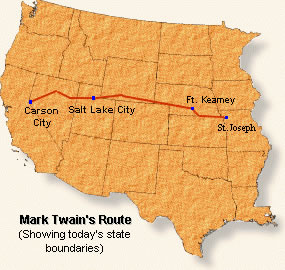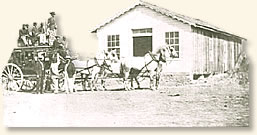|
Riding The Overland Stage, 1861
 In 1861, Mark Twain's (real name Samuel Clemens) brother Orion was named Secretary of Nevada Territory. Twain joined his brother for the trip west. (Some contend the young Twain deserted from the Confederate Army to do so.) Eleven years later Twain described his journey in the book Roughing It. Although its approach is humorous, the book's descriptions are accurate. As Twain notes in his preface, "...there is information in the volume; information concerning an interesting episode in the history of the Far West, about which no books have been written by persons who were on the ground in person, and saw the happenings of the time with their own eyes." In 1861, Mark Twain's (real name Samuel Clemens) brother Orion was named Secretary of Nevada Territory. Twain joined his brother for the trip west. (Some contend the young Twain deserted from the Confederate Army to do so.) Eleven years later Twain described his journey in the book Roughing It. Although its approach is humorous, the book's descriptions are accurate. As Twain notes in his preface, "...there is information in the volume; information concerning an interesting episode in the history of the Far West, about which no books have been written by persons who were on the ground in person, and saw the happenings of the time with their own eyes."
The movies create an idyllic impression of riding the overland stage - smooth travel in roomy comfort. Twain paints a much different picture - passengers crammed together with mailbags, jostled by every bump, breathing dust, and at the mercy of Mother Nature. However, for its time, the stagecoach offered the latest technology in travel, carrying its careening passengers across the Western Plains at speeds greater than any other transport available.
Twain begins his journey in St. Joseph, Missouri, the starting point for the overland route to Sacramento, California. Twain and his brother Orion discover that passengers are limited to only 25 ponds of baggage. After shedding much of their luggage, the intrepid travelers are on their way across the plains of Kansas.
"Our coach was a swinging and swaying cage of the most sumptuous description
- an imposing cradle on wheels. It was drawn by six handsome horses, and by the
side of the driver sat the 'conductor,' the legitimate captain of the craft;
for it was his business to take charge and care of the mails, baggage, express
matter, and passengers. We three were the only passengers this trip. We sat on
the back seat, inside. About all the rest of the coach was full of mail bags
- for we had three days' delayed mail with us. Almost touching our knees, a perpendicular
wall of mail matter rose up to the roof. There was a great pile of it strapped
on top of the stage, and both the fore and hind boots were full. We had twenty-seven
hundred pounds of it aboard, the driver said - 'a little for Brigham, and Carson,
and 'Frisco, but the heft of it for the Injuns, which is powerful troublesome
'thout they get plenty truck to read.' But as he just then got up a fearful convulsion
of his countenance which was suggestive of a wink being swallowed by an earthquake,
we guessed that his remark was intended to be facetious , and to mean that we
would unload the most of our mail matter somewhere on the Plains and leave it
to the Indians, or whosoever wanted it.
We changed horses every ten miles, all day long, and fairly flew over the hard, level road. We jumped out and stretched our legs every time the coach stopped, and so the night found us still vivacious and unfatigued."
The next day, the stage suffers a breakdown forcing its passengers to evacuate while repairs are made. The conductor lays the blame for the mishap on the extra weight of too many mailbags. After throwing half the mail onto the prairie, the stage resumes its journey. Orion's large Unabridged Dictionary causes trouble along the way.
"Whenever the stage stopped to change horses, we would wake up, and try to recollect
where we were - and succeed - and in a minute or two the stage would be off again,
and we likewise. We began to get into country, now, threaded here and there with
little streams. These had high, steep banks on each side, and every time we flew
down one bank and scrambled up the other, our party inside got mixed sowewhat.
First we would all lie down in a pile at the forward end of the stage, nearly
in a sitting posture, and in a second we would shoot to the other end and stand
on our heads. And we would sprawl and kick, too, and ward off ends and corners
of mail-bags that came lumbering over us and about us; and as the dust rose from
the tumult, we would all sneeze in chorus, and the majority of us would grumble,
and probably say some hasty thing, like: 'Take your elbow out of my ribs! Can't
you quit crowding?'
Every time we avalanched from one end of the stage to the other, the Unabridged Dictionary would come too; and every time it came it damaged somebody. One trip it 'barked' the Secretary's elbow; the next trip it hurt me in the stomach, and the third it tilted Bemis's nose up till he could look down his nostrils - he said. The pistols and coin soon settled to the bottom, but the pipes, pipe-stems, tobacco, and canteens clattered and floundered after the Dictionary every time it made an assault on us, and aided and abetted the book by spilling tobacco in our eyes, and water down our backs."
Each evening, the stage announces its approach to a way station by the driver blowing a bugle. The way station offers sparse comfort.
"The station buildings were long, low huts, made of sun-dried, mud-colored bricks, laid up without mortar (adobes the Spaniards call these bricks, and Americans shorten it to 'dobies.)The roofs, which had no slant to them worth speaking of, were thatched and then sodded or covered with a thick layer of earth, and from this sprang a pretty rank growth of weeds and grass. It was the first time we had ever seen a man's front yard on top of his house. The buildings consisted of barns, stable-room for twelve or fifteen horses, and a hut for an eating room for passengers. This latter had bunks in it for the station-keeper and a hostler or two.

The stage makes a stop at a way station
ca. 1869. The soldiers riding on top
provide protection. |
You could rest your elbow on its eaves, and you had to bend in order to get in at the door. In place of a window there was a square hole about large enough for a man to crawl through, but this had no glass in it. There was no flooring, but the ground was packed hard. There was no stove, but fire-place served all needful purposes. There were no shelves, no cupboards, no closets. In a corner stood an open sack of flour, and nestling against its base were a couple of black and venerable tin coffee-pots, a tin teapot, a little bag of salt, and a side of bacon.
By the door of the station keeper's den, outside, was a tin wash-basin, on the ground. Near it was a pail of water and a piece of yellow soap, and from the eves hung a hoary blue woolen shirt, significantly - but this latter was the station-keeper's private towel, and only two persons in all the party might venture to use it - the stage-driver and the conductor."
The passengers eagerly await the spectacle of an encounter with a Pony Express rider racing his load of mail to its next transfer point.
Presently the driver exclaims:
'HERE HE COMES!'
Every neck is stretched further, and every eye strained wider. Away across the endless dead level of the prairie a black speck appears against the sky, and it is plain that it moves. Well, I should think so! In a second or two it becomes a horse and rider rising and falling, rising and falling - sweeping toward us nearer and nearer and still nearer - growing more and more distinct, more and more sharply defined - nearer and still nearer, and the flutter of the hoofs comes faintly to the ear - another instant a whoop and a hurrah from our upper deck, a wave of the rider'' hand, but no reply, and a man and horse burst past our excited faces, and go winging away like a belated fragment of a storm!
Near Salt Lake City, the stage passes a wagon train filled with Mormons making the trek westward.
"Just beyond the breakfast-station we overtook a Mormon emigrant train of thirty-three
wagons; and tramping wearily along and driving their herd of lose cows, were
dozens of coarse-clad and sad-looking men, women, and children, who had walked
as they were walking now, day after day for eight lingering weeks, and in that
time had compassed the distance our stage had come in eight days and three hours - seven hundred and ninety-eight miles! They were dusty and uncombed, hatless, bonnetless and ragged, and they did look so tired!"
References:
Collins, Richard (ed.), The American Frontier (1992); Twain, Mark, Roughing It (1872).
How To Cite This Article:
"Riding The Overland Stage, 1861," EyeWitness to History, www.eyewitnesstohstory.com (1998).
|






